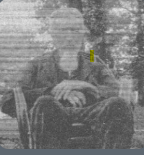Who Was Hugh’s Father?

Was Sampson Caudill (1784 – 1863) the father of Hugh Caudle(1812--1859)? Genealogists and family historians have long speculated about the identity of the father of Hugh Caudle (1812 – 1859). Clayton Cox, the genealogist and long-time authority on the Caudill family, never provided an answer. [1] An article in Cordell Clippings , the newsletter of the Cordell Family Association (now inactive) No.10, January 1994, may be the source of the many assertions that Hugh was the son of Sampson Caudle. [2] The Caudills (Caudles, Caddells, Coddles, Cordels, Codills, and many other spellings) are a large and well-documented family. The first documentation of a Caudle in America is a Virginia Land Grant to Stephen “Cawdle” from King George of England in 1731. [3] By the time of the Revolutionary War, the family had migrated to North Carolina. [4] The family had begun migrating to eastern Kentucky by 1789. [5] TRACKING THE MIGRATION OF TWO FAMILIES In 1820, Sa...




